
Facebook are NOT going after children, claims Zuckerberg (while Sarkozy says internet freedom will lead to anarchy)
Daily Mail Reporter
- Zuckerberg said comments were taken out of context
- French President clashes with Google and Facebook over privacy
- David Cameron to oppose plan to be discussed at G8
Mark Zuckerberg has denied allegations he was trying to open up Facebook to children under the age of 13, claiming his comments were taken out of context.
The social networking site, which has more than half a billion active users, operates policies around the world not to register children under a certain age. The age varies by country but is typically around 13.
When asked about the issue at the e-G8 Internet forum in Paris on Wednesday, he said: 'We're not trying to work on the ability for people under the age of 13 to sign up.'
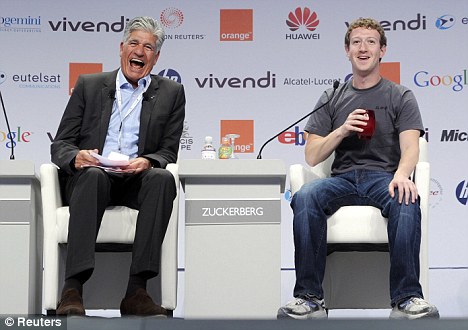
Denial: Mark Zuckerberg changed from his suit into his usual jeans and t-shirt to fend off questions from reporters at eG8 forum about letting children use the site
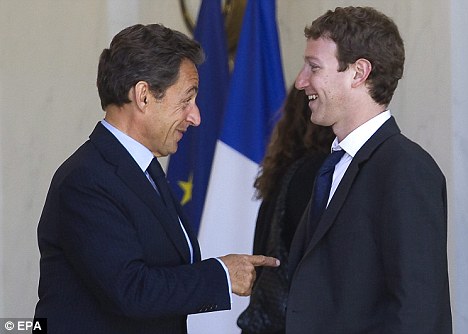
Demands: French President Nicolas Sarkozy, left, pictured with Facebook CEO Mark Zuckerberg today, has called for regulation of the internet
The media attacked the billionaire after he made comment about children using the site at an education conference last week, which he said was completely taken out of context.
He said the complexity of protecting children online meant the question was not a priority for the company.
'That's just not top of the list of things for us to figure out right now,' said Zuckerberg. 'Some time in the future, I think it makes sense to explore that, but we're not working on it right now.'
Meanwhile, Nicolas Sarkozy has claimed the lack of regulation online risks plunging the world into anarchy.
In an extraordinary attack on internet freedoms, the French president said that governments must be included in regulating the virtual world.
He claimed that excluding officials took 'the risk of democratic chaos and hence anarchy.'
'Now that the internet is an integral part of most people's lives, it would be contradictory to exclude governments from this huge forum,' he said.
'Nobody could nor should forget that these governments are the only legitimate representatives of the will of the people in our democracies.
'To forget this is to take the risk of democratic chaos and hence anarchy.'
Mr Sarkozy''s comments were addressed to an audience of leading multimedia executives who had gathered in Paris for a conference ahead of the G8 summit.
Plans by Mr Sarkozy for global co-operation in regulating the internet will be opposed by David Cameron, it was reported today.
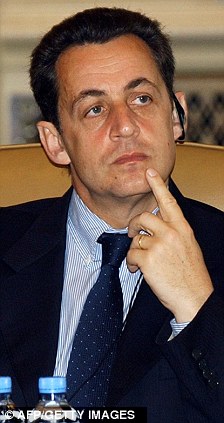
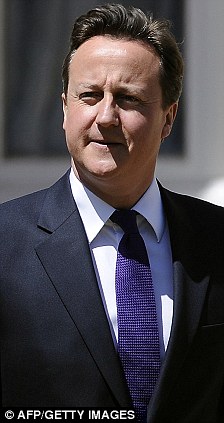
Clash of the tech titans: Nicolas Sarkozy, left, angered Google CEO, Eric Schmidt, right, over limiting abuse of the internet at international web summit
A Downing Street official said: 'We will not be regulating the internet any time soon.'
The announcement came as debates raged over the legality of breaking injunctions such as the one taken out by Ryan Giggs via internet-based media such as Twitter.
Mr Sarkozy's comments angered Google Inc's Eric Schmidt, who said no one would win if ‘some stupid rule,’ stunted the growth of the web.
Mr Sarkozy is notorious among techies for creating a law that calls for copyright pirates to be cut off from the internet.
He caused further animosity when he lauded the gathering of tough tech titans executives, that included Facebook's Mark Zuckerberg, for helping fuel the Arab spring and spurring economic growth.
The Facebook founder played down the role his social network had played in revolutions that have rocked countries from Tunisia to Egypt to Libya.
He said: 'It's not a Facebook thing, it's an Internet thing. I think Facebook was neither necessary nor sufficient for any of those things to happen.'
'If it weren't Facebook, it would be something else.'
Millions of users in the Middle East have used Facebook and Twitter to organize protests in recent months.
At the summit held in Paris, the French politician softened his usually tough stance on internet regulation but stark divisions remained on everything from privacy to copyright.
As speakers paraded on a stage built in the Tuileries Gardens of central Paris, deep rifts between policymakers and internet executives became apparent, with few signs of how they would be resolved in the two-day forum.
A draft communique, which is being finalised for release at the conclusion of the forum, suggests that the gathering will paper over the deepest divisions and shy away from making concrete policy proposals.
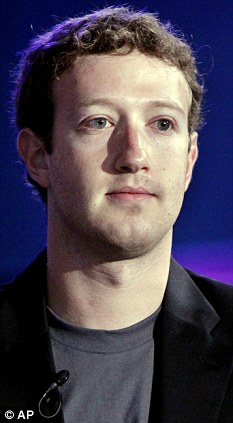
Facebook feud: The French President attacked tech experts, including Facebook's Mark Zuckerberg, for helping fuel the Arab spring and spurring economic growth
The draft will urge G8 leaders to adopt an international approach to protecting users' personal data but will sidestep the fraught issue of intellectual property by leaving it largely under the purview of national governments.
Copyright has proven one of the most divisive issues at the forum.
Executives from big music and publishing groups have argued for more protection of their works, while internet executives and activists criticize anti-piracy measures, such as France's anti-piracy law, as crimping the web's essential open nature.
Yochi Benkler, a Harvard University professor known for championing open source ideas, said governments must be careful about unintended consequences of strict copyright rules.
‘You can make the Internet safe for Justin Bieber and Lady Gaga, or you can make it safe for the next Skype,’ said Benkler, referring to the pop music stars and the wildly successful start-up internet telephony service. ‘You have to choose.’
The draft communique tries to split the difference:
‘With regard to the protection of intellectual property ... we recognize the need to have national laws and frameworks for improved enforcement, while encouraging the development of online trade in goods and content which are respectful of intellectual property,’ it says.
The question of how to protect users from losing control of their personal data or being tracked by companies for profit was also the source of division at the forum.
Cultural differences between America and Europe were deep, with Europeans less willing to give up their privacy in exchange for the benefits of new services like Facebook and more willing to turn to regulation than their American counterparts.
Privacy issues are moving center stage after the high-profile hack of Sony Corp's PlayStation network and amid a regulatory review in Europe, which could lead to stricter requirements on internet companies, such as registering their databases and notifying users of data breaches.
The draft communique doesn't propose any solutions.

Under wraps: Twitter led to the revealing of Ryan Giggs as the married footballer who took out an injunction preventing the revealing of his alleged affair
‘We encourage the development of common approaches taking into account national legal frameworks, based on fundamental rights and that protect personal data, whilst allowing the legitimate transfer of data,’ it says.
A delegation of internet executives are set to travel to the G8 meeting in French seaside resort of Deauville later this week to present the forum's findings to the heads of state.
Maurice Levy, chief executive of advertising firm Publicis, which is hosting the conference, said the group didn't have to resolve the many debates over the internet's future.
‘The final document need not be a consensual document,’ he said. ‘It may present contradictions. It could present disagreements.’
May 25, 2011
